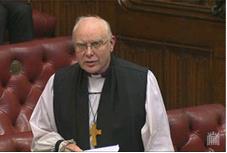“We [must] steer a course between tolerating bad behaviour on the one hand, and on the other hand taking an overly punitive and controlling approach to those whose behaviour can just be annoying. I am not here thinking of street preachers or those who sing hymns very loudly—though a balance has to be struck even in those instances—but chiefly of young people and the more vulnerable among adults.”
On 29th October 2013, the Bishop of Lichfield, the Rt Revd Jonathan Gledhill, spoke in the Second Reading debate of the Government’s Anti-social Behaviour, Crime and Policing Bill. He welcomed measures in the Bill on strengthening firearm regulations, tackling forced marriage and reforms to the College of Policing’s code of ethics. He raised concerns about the newly proposed definition for ‘anti-social behaviour’, suggesting that young people and vulnerable adults could be at risk from a broad definition.
 The Lord Bishop of Lichfield: My Lords, there is much to welcome in this Bill. The strengthening of the laws on firearms and on forced marriage, for example, are obvious steps forward. The measures for prevention of sexual harm, while raising important issues about the need for caution in restricting the freedoms of unconvicted people, will make possible swifter and more effective action to protect potential victims. The College of Policing has made an encouraging start. I am pleased to welcome the draft code of ethics. It sets a strong, ethical and I would say spiritual basis for law and its enforcement, which is a key concern for us all.
The Lord Bishop of Lichfield: My Lords, there is much to welcome in this Bill. The strengthening of the laws on firearms and on forced marriage, for example, are obvious steps forward. The measures for prevention of sexual harm, while raising important issues about the need for caution in restricting the freedoms of unconvicted people, will make possible swifter and more effective action to protect potential victims. The College of Policing has made an encouraging start. I am pleased to welcome the draft code of ethics. It sets a strong, ethical and I would say spiritual basis for law and its enforcement, which is a key concern for us all.
The emphasis on communities—people working together for the common good—has run through the long gestation period of these proposals. The principles of restorative justice and restorative practice, especially in local communities, are built into the efforts of churches in every part of this country to serve their local communities and especially those who are most vulnerable. In my part of the world, 80% of young people typically reoffend in the first two years after their sentence. However, with those who are taken on board by church monitoring and mentoring groups, even with the more difficult cases, the rate of reoffending is less than 20%. Continue reading “Bishop of Lichfield urges caution in redefining ‘anti-social behaviour’”
 In the House of Lords on 30th June 2014, Liberal Democrat peer Lord Clement-Jones asked Her Majesty’s Government what assessment they have made of the link between busking and crime and disorder; and what plans they have to issue revised guidance on the use of the Metropolitan Police Act 1839 and the Police and Criminal Evidence Act 1984 in respect of busking. The Bishop of Chester, the Rt Revd Peter Forster, asked a supplementary question.
In the House of Lords on 30th June 2014, Liberal Democrat peer Lord Clement-Jones asked Her Majesty’s Government what assessment they have made of the link between busking and crime and disorder; and what plans they have to issue revised guidance on the use of the Metropolitan Police Act 1839 and the Police and Criminal Evidence Act 1984 in respect of busking. The Bishop of Chester, the Rt Revd Peter Forster, asked a supplementary question. In the House of Lords on 30th June 2014, Liberal Democrat peer Lord Clement-Jones asked Her Majesty’s Government what assessment they have made of the link between busking and crime and disorder; and what plans they have to issue revised guidance on the use of the Metropolitan Police Act 1839 and the Police and Criminal Evidence Act 1984 in respect of busking. The Bishop of Chester, the Rt Revd Peter Forster, asked a supplementary question.
In the House of Lords on 30th June 2014, Liberal Democrat peer Lord Clement-Jones asked Her Majesty’s Government what assessment they have made of the link between busking and crime and disorder; and what plans they have to issue revised guidance on the use of the Metropolitan Police Act 1839 and the Police and Criminal Evidence Act 1984 in respect of busking. The Bishop of Chester, the Rt Revd Peter Forster, asked a supplementary question.









You must be logged in to post a comment.